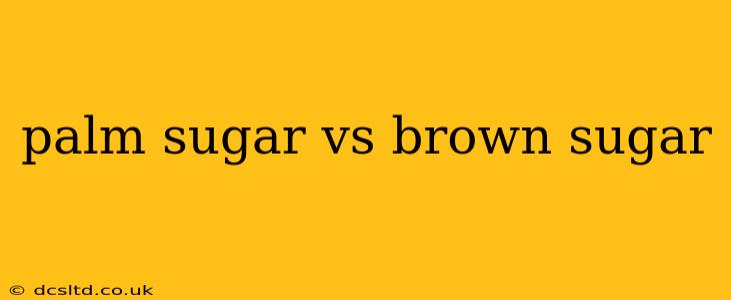Choosing between palm sugar and brown sugar can feel overwhelming, especially with the growing popularity of palm sugar as a healthier alternative. Both offer distinct flavors and textures, impacting your baking and cooking experiences significantly. This comprehensive guide dives deep into the differences, helping you make the best choice for your culinary needs.
What is Palm Sugar?
Palm sugar, also known as jaggery, is a natural sweetener derived from the sap of various palm trees, primarily the coconut, date, and nipa palm. Unlike refined sugars, palm sugar retains many of its natural nutrients and minerals, including iron, potassium, and zinc. Its production involves boiling down the sap until it crystallizes, resulting in a product that varies in color from light brown to dark brown, almost black, depending on the refining process. The flavor profile is often described as caramel-like, with hints of molasses and a subtle smoky undertone.
What is Brown Sugar?
Brown sugar is a refined sugar product that has had molasses added back after processing. The molasses content determines the color and flavor intensity; light brown sugar has less molasses and a milder flavor, while dark brown sugar has more molasses and a deeper, richer taste. While brown sugar provides some trace minerals, it's significantly less nutrient-rich than palm sugar.
Palm Sugar vs. Brown Sugar: A Detailed Comparison
Here's a head-to-head comparison to clarify the key distinctions:
| Feature | Palm Sugar | Brown Sugar |
|---|---|---|
| Source | Sap of palm trees | Refined sugarcane or beet with molasses added |
| Nutrient Content | Richer in minerals (iron, potassium, zinc) | Lower in minerals, primarily carbohydrates |
| Flavor | Caramel-like, molasses notes, smoky undertones | Varies depending on molasses content, generally milder than palm sugar |
| Texture | Can be granular, soft, or liquid | Granular |
| Color | Light to dark brown, sometimes almost black | Light to dark brown |
| Glycemic Index | Generally lower than white or brown sugar | Higher than palm sugar |
What are the Health Benefits of Palm Sugar?
H2: Is palm sugar healthier than brown sugar?
While both are sugars and should be consumed in moderation, palm sugar generally boasts more nutritional value due to its higher mineral content. Its lower glycemic index (GI) also means it causes a slower rise in blood sugar levels compared to brown sugar, making it a potentially better choice for individuals managing diabetes or blood sugar levels. However, it's crucial to remember that it's still a source of sugar and should be consumed in moderation as part of a balanced diet.
How Do Palm Sugar and Brown Sugar Taste Different?
H2: What does palm sugar taste like compared to brown sugar?
Palm sugar offers a more complex and intense flavor profile than brown sugar. The caramel notes, hints of molasses, and subtle smokiness make it a unique sweetener. Brown sugar, in contrast, tends to have a milder, sweeter taste, varying depending on the amount of molasses present. The difference is quite noticeable, especially in baked goods where the distinct flavor of palm sugar can shine through.
Which Sugar is Better for Baking?
H2: Can I substitute brown sugar for palm sugar in baking?
Substituting palm sugar for brown sugar requires careful consideration. Palm sugar’s moisture content can be higher, which might alter the texture of your baked goods. You might need to adjust the amount of other liquids in the recipe or add some additional dry ingredients to compensate for the moisture difference. Moreover, the distinct flavor of palm sugar will impact the overall taste of your creation. For recipes where a subtle sweetness is desired, brown sugar might be the better choice. Experimentation is key to mastering substitutions.
Which Sugar is Better for Cooking?
H2: Is palm sugar good for cooking savory dishes?
Palm sugar's rich flavor makes it an excellent choice for savory dishes, particularly those with Asian or Southeast Asian influences. Its caramel-like notes and smoky undertones add depth and complexity to stir-fries, curries, and sauces. Brown sugar, while also usable, might lack the intensity needed to complement the other flavors.
In conclusion, the choice between palm sugar and brown sugar depends largely on your personal preference, the specific recipe, and your health considerations. Both offer distinct flavors and characteristics, making them versatile options for sweet and savory dishes. However, always remember to consume sugar in moderation as part of a healthy diet.
